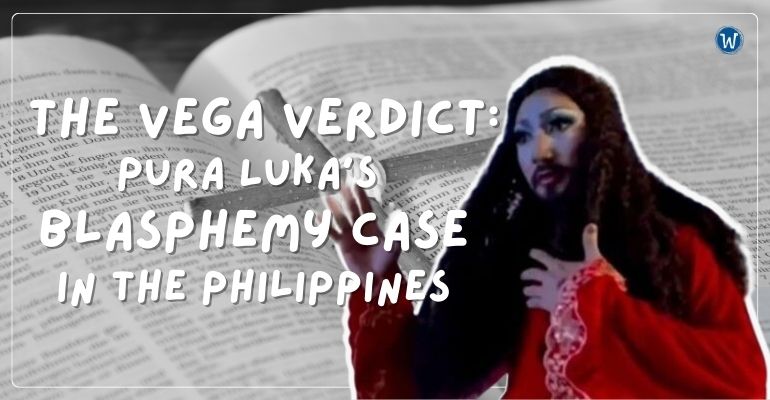In recent news, the Philippines witnessed developments on the blasphemy case of Pura Luka Vega who was arrested in October 4.
The drag queen faced condemnation for dressing as Jesus Christ and performing a rock version of the Lord’s Prayer. Christian groups accused her of “desecrating their faith,” leading to persona non grata declarations by multiple cities before her arrest.
Given the swift augmentation of her case, is it safe to say that blasphemy is a crime?
Is Blasphemy a Crime in the Philippines?
Catholicism culturally dominates the Philippines as a nation. This dominance of the Catholic Church extends to the realm of law and regulation, notably in the context of blasphemy. Article 133 of the Revised Penal Code specifically addresses offenses against religious worship and feelings. This includes acts that are “notoriously offensive to the feelings of the faithful.”
The penal code has largely remained unchanged since 1930, enshrining the provision. It has been a source of concern for those advocating for freedom of speech and expression. Critics argue it limits dissent from religious beliefs and hampers the fundamental right to express one’s thoughts freely.
Blasphemy in Practice: The Carlos Celdran Case
Carlos Celdran’s case illustrates a legal stance on blasphemy as crime in the Philippines. In 2010, Celdran protested against the Catholic Church’s interference in the passage of the Reproductive Health Bill. During Mass, he raised a “Damaso” placard in the Manila cathedral, referencing a national novel’s character. As a result, the court convicted him and sentenced him to imprisonment under Article 133 of the penal code.
Senator Leila de Lima has been a vocal advocate for the repeal of this provision. She asserted that it violates an individual’s constitutional right to freedom of speech and expression. Moreover, De Lima argued that the United Nations Human Rights Committee emphasizes the importance of protecting freedom of thought and conscience equally with freedom of religion and belief.
The Push for Change
In 2019, Senator Leila de Lima took action to challenge the constitutionality of Article 133, citing its obsolescence and overbreadth. The Office of the Solicitor-General even agreed with the senator’s stance and called for declaring the provision unconstitutional. Critics argue that this provision is vague and overly broad, suppressing legitimate forms of expression.
A Perspective from the Catholic Church
Amidst the controversy surrounding Pura Luka Vega’s performance, the Catholic Bishops’ Conference of the Philippines (CBCP) president, Caloocan Bishop Pablo Virgilio David, offered a unique perspective. While acknowledging that people may blaspheme Christ through mockery of religious icons and teachings, he highlighted the broader forms of blasphemy that often go unnoticed. These include failing to help those who are suffering and failing to recognize the face of Jesus in marginalized and oppressed individuals.
The Ongoing Debate
In conclusion, the question of whether blasphemy is a crime in the Philippines is a complex and ongoing debate. The country’s legal framework has been used to address cases of blasphemy, but there is a growing push for reform and a reevaluation of the constitutionality of such laws.
The recent incident involving Pura Luka Vega has brought this issue to the forefront of public discourse. Critics argue that these laws may infringe upon individuals’ constitutional rights to freedom of speech and expression. This is enshrined in the 1987 Constitution, specifically in Article II Section 6 which states that “The separation of Church and State shall be inviolable.”
As the country struggles with its cultural and legal ties to Catholicism, the future of blasphemy crimes and laws in the Philippines and the broader concept of the separation of Church and State remain subjects of ongoing debate and reflection.
Ultimately, it is a matter of finding a delicate equilibrium between respecting religious beliefs and upholding fundamental human rights in a democratic society, as defined by the nation’s supreme law.
Also read: Van Gogh Alive in BGC: Grab Your Tickets for an Artistic Journey!

Leave a Reply